TechRadar Verdict
I’ve been really impressed with the performance of the Dyson Purifier Cool Formaldehyde TP09 purifying fan. It had the skills to detect a wide range of contaminants and reacted quickly to particles including dry shampoo and perfume, and the MyDyson app proved helpful and responsive. The airflow function isn't as strong as a dedicated fan, it's still a useful added extra. Overall, this sleek looking purifier is well worth the investment.
Pros
- +
Detects and reacts to a wide range of contaminants
- +
Fast reaction speeds
- +
Informative companion app
- +
Real-time air quality readings
- +
Can turn fan 'off' when not wanted
Cons
- -
Need to shop around for best price in the US
- -
Doesn't tackle odors
- -
Good not great as a fan
Why you can trust TechRadar
Dyson Purifier Cool Formaldehyde TP09: two-minute review
The Dyson Purifier Cool Formaldehyde TP09 is a tower fan and air purifier combo with smart capabilities, which allows for easy control and air data reviewing via the MyDyson companion app.
With a list price of $749.99 / £549.99 / AU$999.99, the white and gold Dyson Purifier Cool Formaldehyde TP09 purifying fan is well-priced in the UK and Australia, but curiously costs much more for the nickel and gold colorway at Dyson US. Fortunately, I’ve spotted the white and gold model at a discounted rate from third-party retailers, with Walmart offering it for just $519 at the time of writing.
Replacement filters are on the pricey side at a list price of $79.99 / £75 / AU$99, and Dyson recommends changing them every 12 months, so it’s important to factor this cost into your budget.
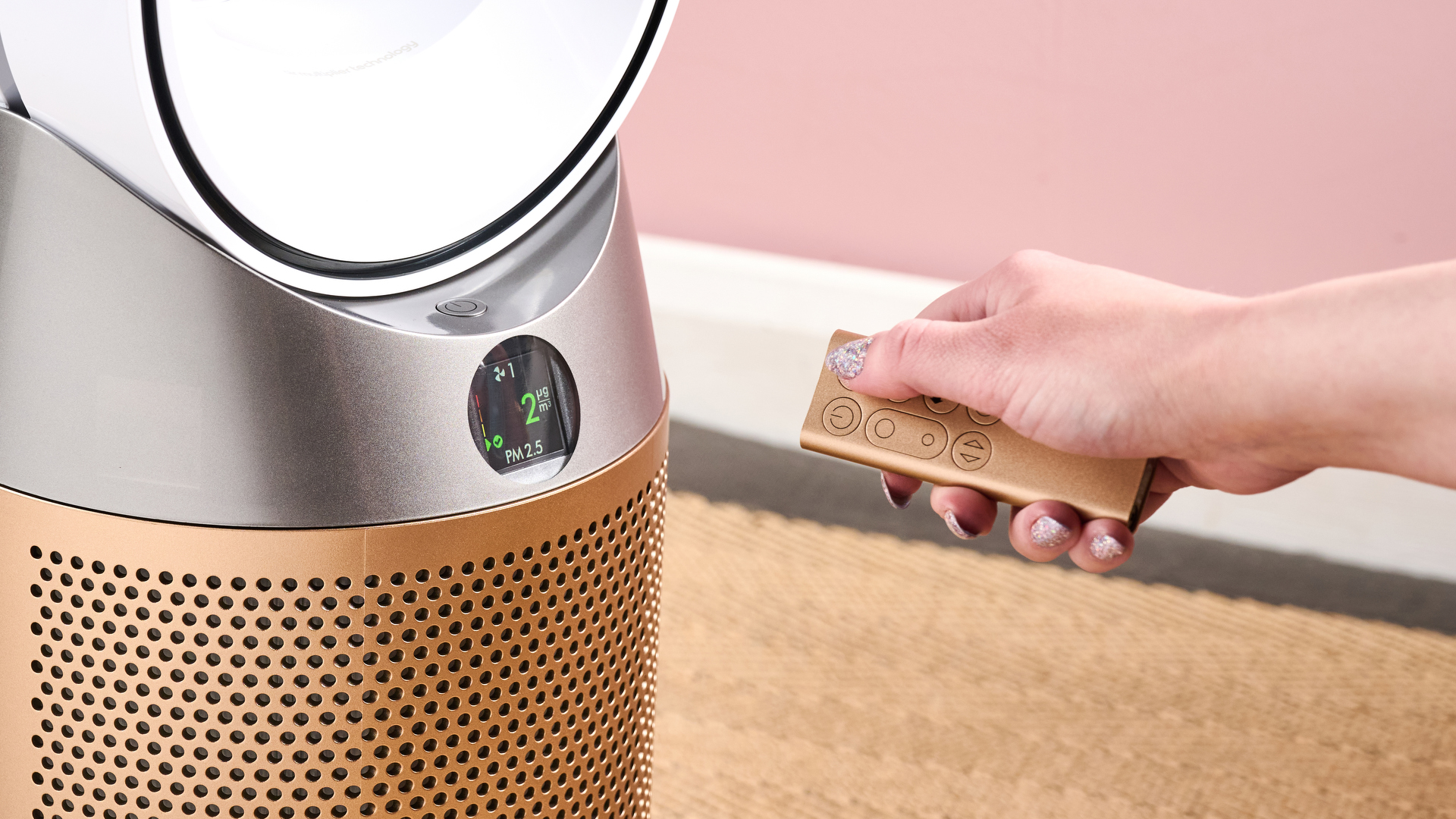
I really like the aesthetics of the UK model I tested, the white and gold colorway is a little more exciting to look at than the standard white and nickel we see on other Dyson purifying fans – though I must say, I consider the color of the shroud to be more copper than gold.
There are 10 fan speeds on offer, plus an auto mode that rouses the TP09 into action whenever it detects contaminants. And it's able to detect these from an impressively wide range of sources, including PM2.5 and PM10, VOCs, formaldehyde, and nitrogen dioxide.
In fan mode, it offers a decent flow of air, and while it's not as powerful as the best fans I've tested, it's still strong enough to be useful on a hot day. For when you don't need cooling, Dyson has added a Diffused mode, which diverts the airflow out of the back of the loop amplifier. This means you don’t have to worry about it blasting cold air toward you as it tackles contaminants in the winter months, and is an option you won't find on cheaper Dyson purifying fans.
The MyDyson companion app proved insightful and responsive when communicating air quality changes and when I was using it to control the TP09. It offered insight into the air quality readings and also provided access to some great additional controls, such as selecting the point to begin oscillating from, saving me from needing to adjust the position of the TP09 manually.
Sign up for breaking news, reviews, opinion, top tech deals, and more.
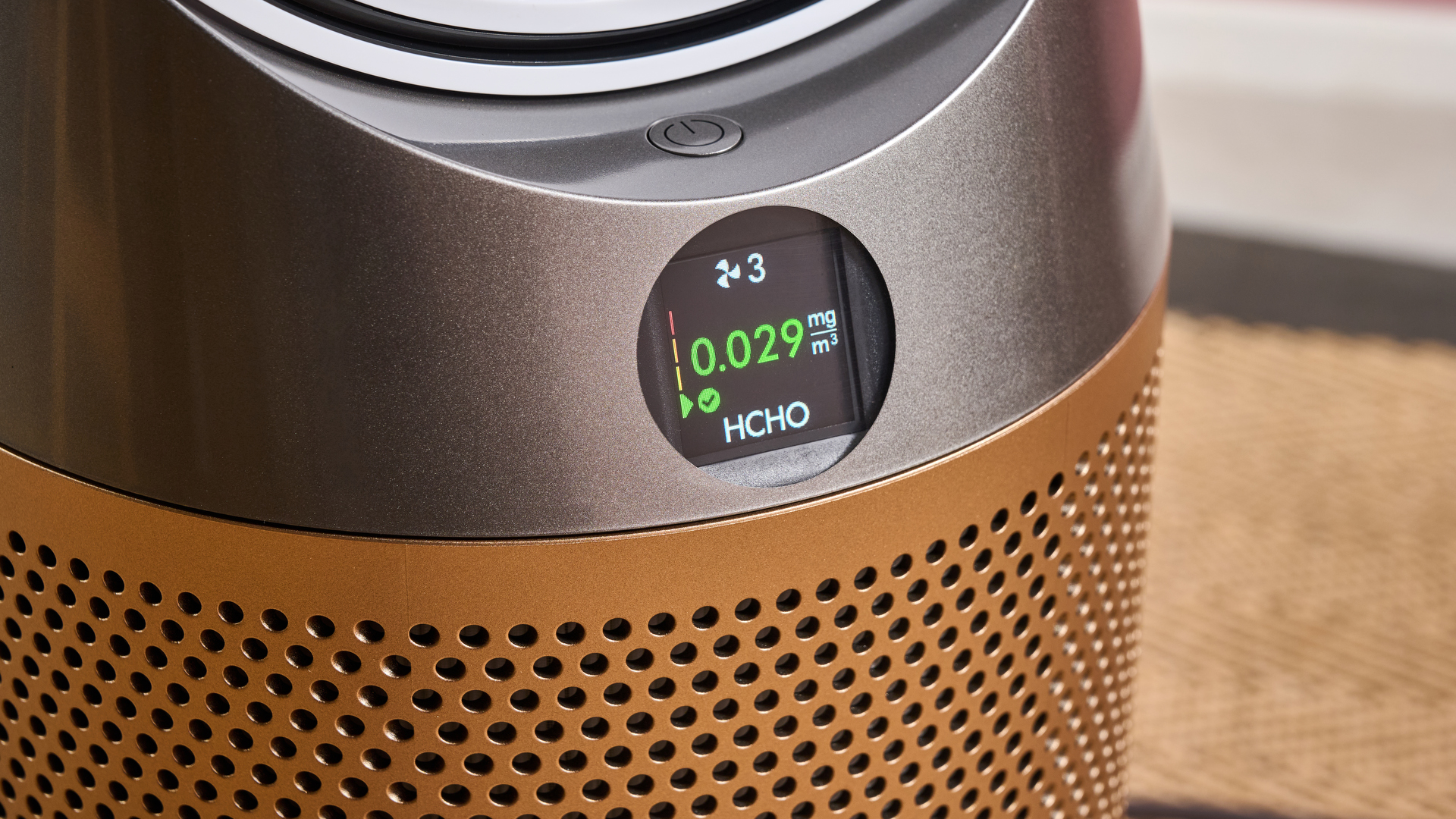
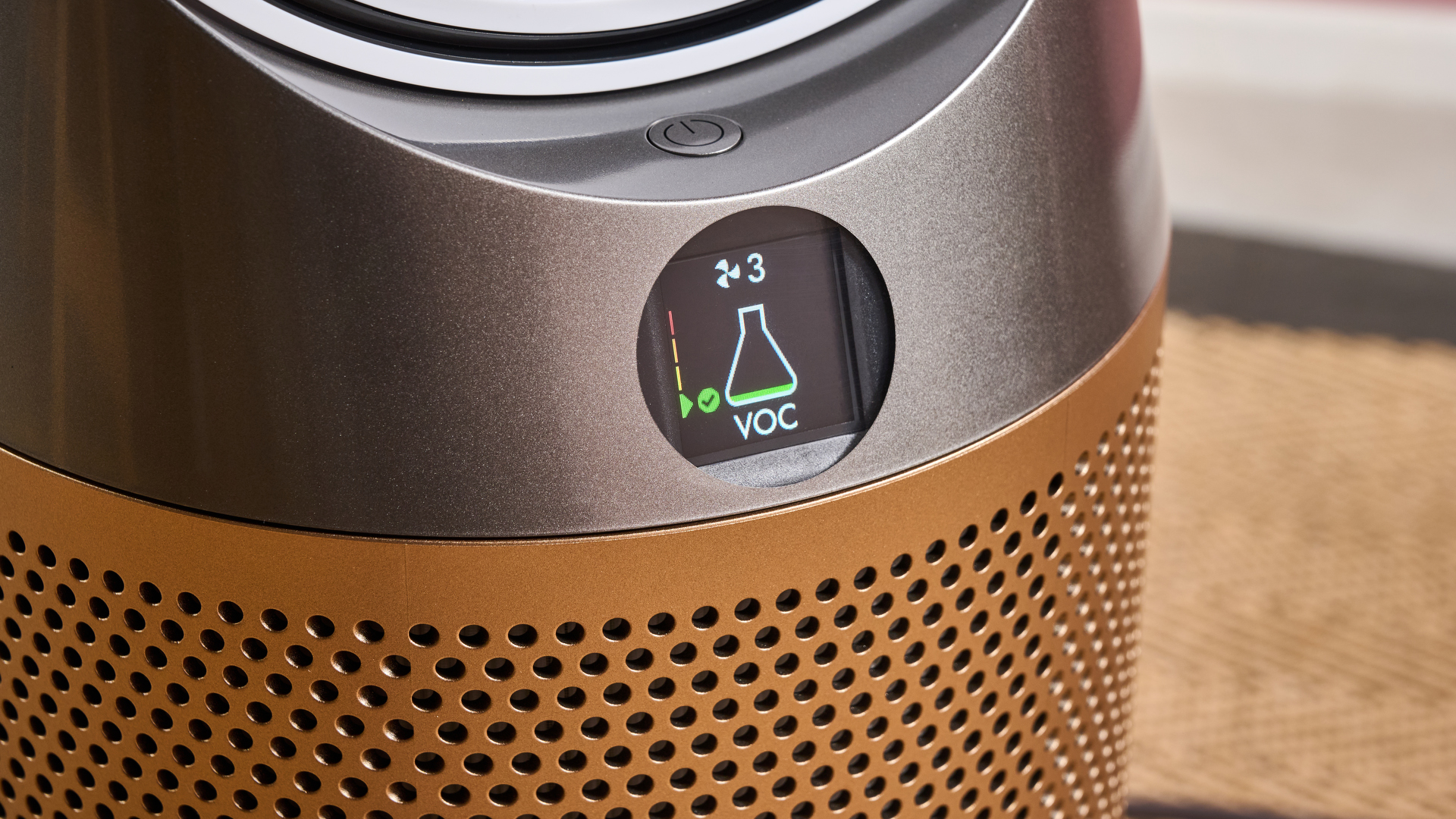
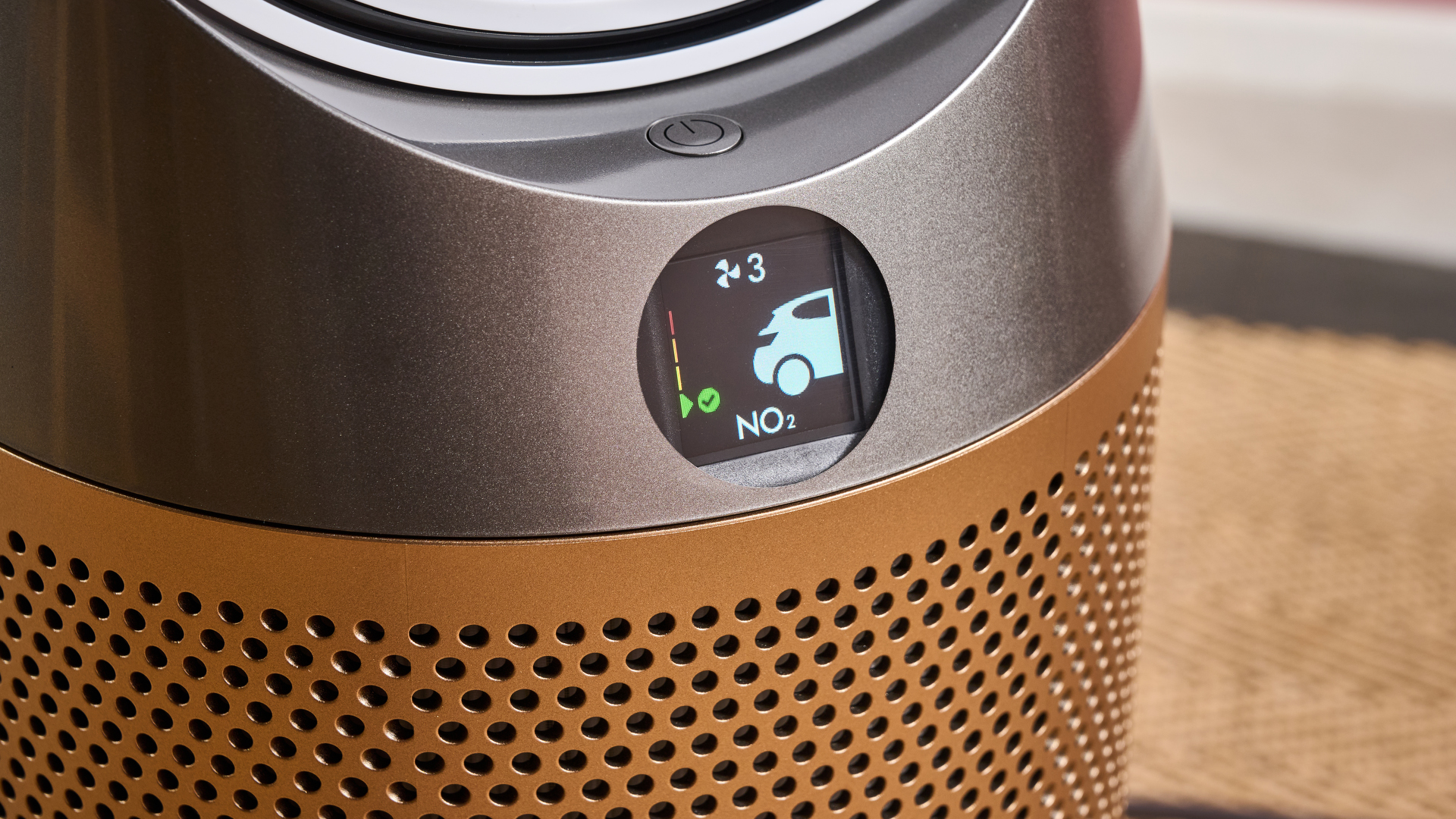
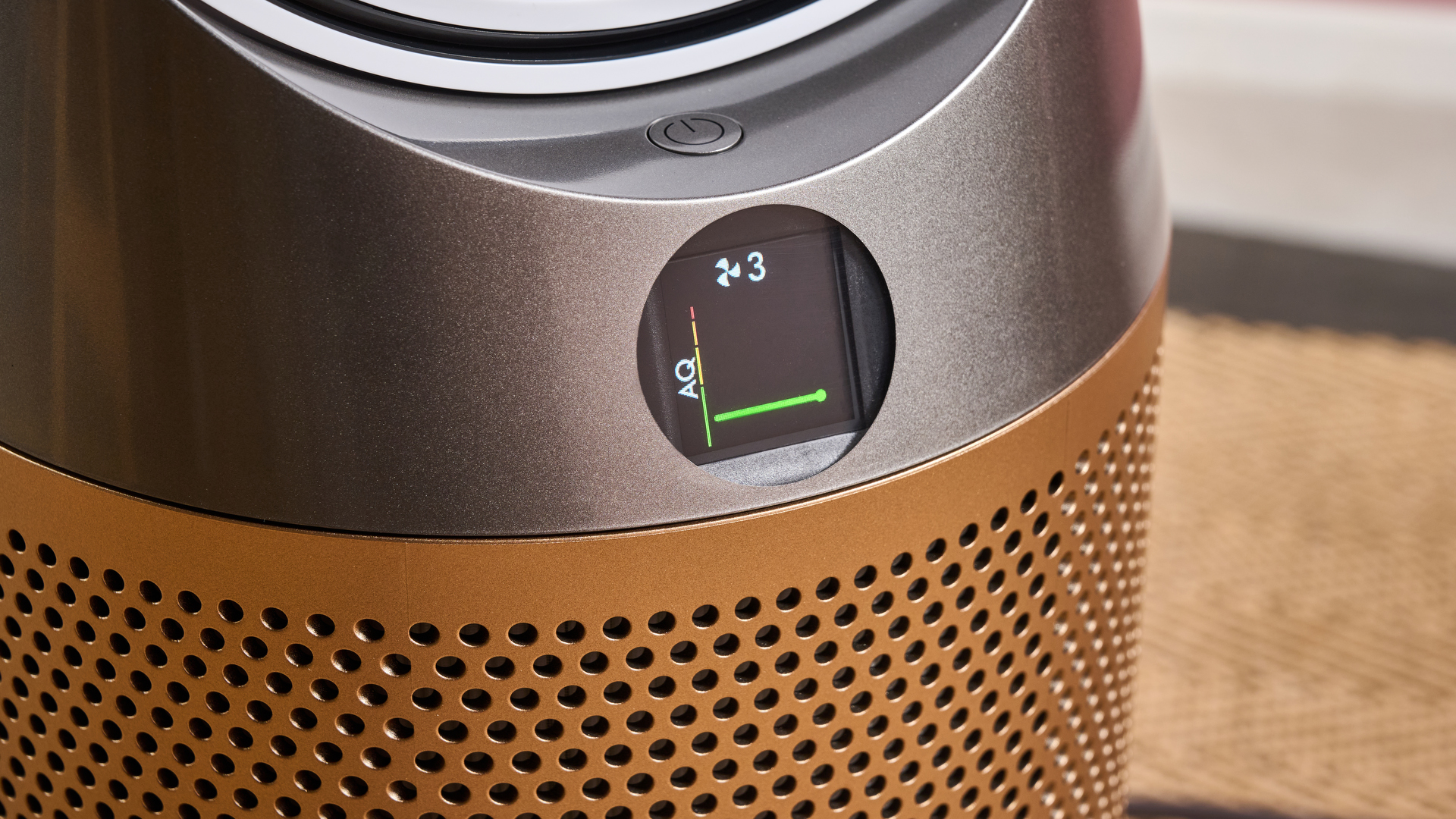
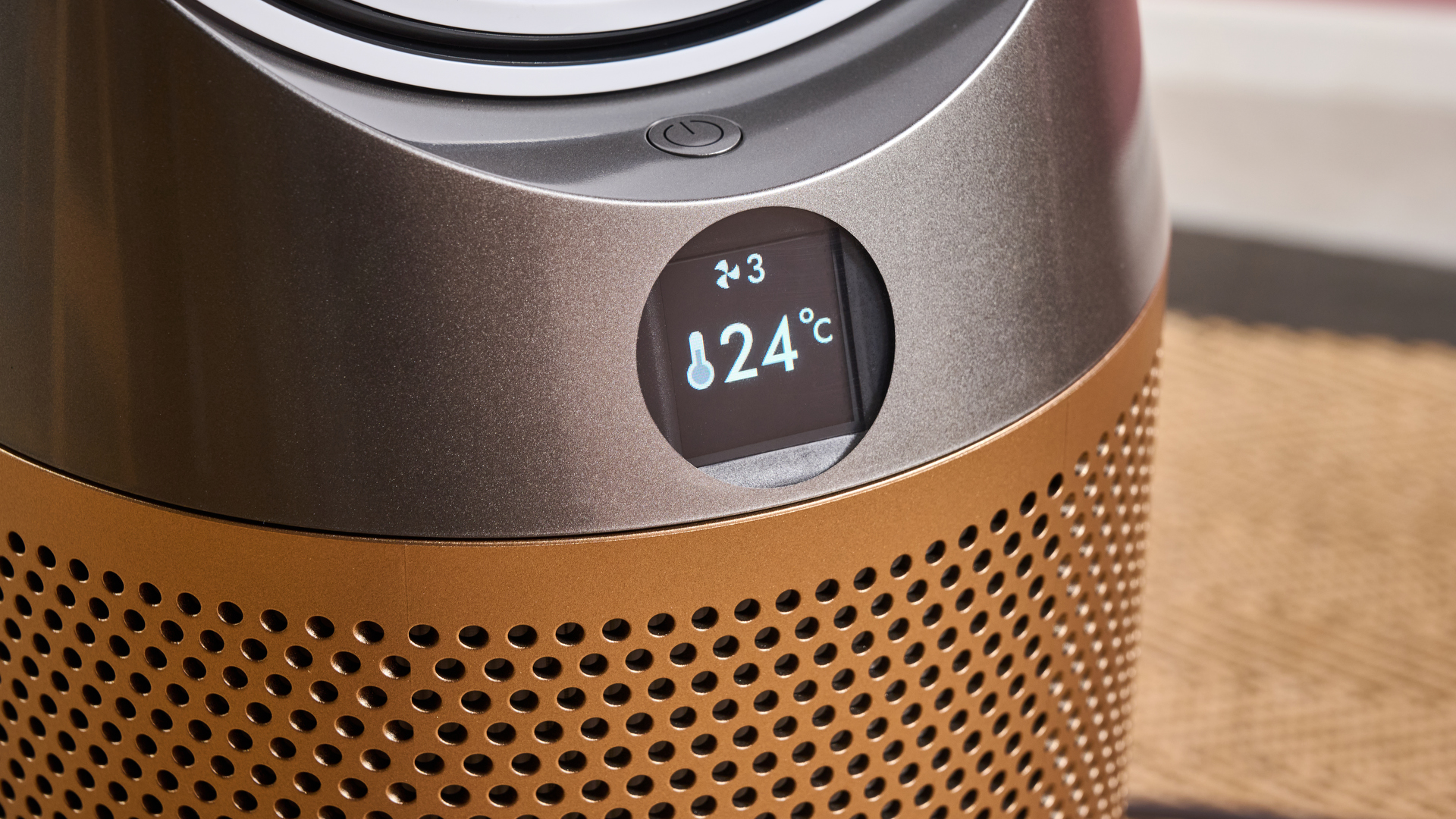
The TP09 reacted promptly to contaminants both in testing and day-to-day use. It was quick to notice whenever I sprayed myself with perfume on the other side of the room, and automatically increased the airflow to tackle the detected VOCs. Despite this though, it didn’t have any noticeable effect on the fragrance in the air.
The TP09 delivered an impressive performance overall. It proved easy to operate, the controls were responsive, and it was quick to react whenever contaminants were introduced. It didn’t appear to tackle odors well, but I’m yet to test an air purifier that performs particularly proficiently in this area.
Considering the range of contaminants the TP09 is capable of detecting and reacting to, plus the responsive controls, air quality breakdown and air quality history available on the MyDyson app, you get plenty of bang for your buck with the Dyson Purifier Cool Formaldehyde TP09. I highly recommend shopping around for the best price if you’re in the US, though.
In fact, I’m such a fan of the purifying abilities of the TP09 that I could easily see it sneaking its way into our list of the best air purifiers.
Dyson Purifier Cool Formaldehyde TP09 review: price & availability
- List price: $749.99 / £549.99 / AU$999.99
- Available now in the US, UK, and Australia
Available to buy from the Dyson website and other third-party retailers in the US, UK, and Australia, the Dyson Purifier Cool Formaldehyde TP09 purifying fan has a list price of $749.99 / £549.99 / AU$999.99. This is an attractive price in the UK and Australia, but a little high in the US.
If you’re in the US, then I’d highly recommend shopping around. While the nickel and gold model is pricey on the Dyson website, at the time of writing, I’ve spotted the white and gold Dyson Purifier Cool Formaldehyde TP09 for much more reasonable prices at Amazon, Best Buy, and Walmart, with the latter offering the TP09 for just $519.
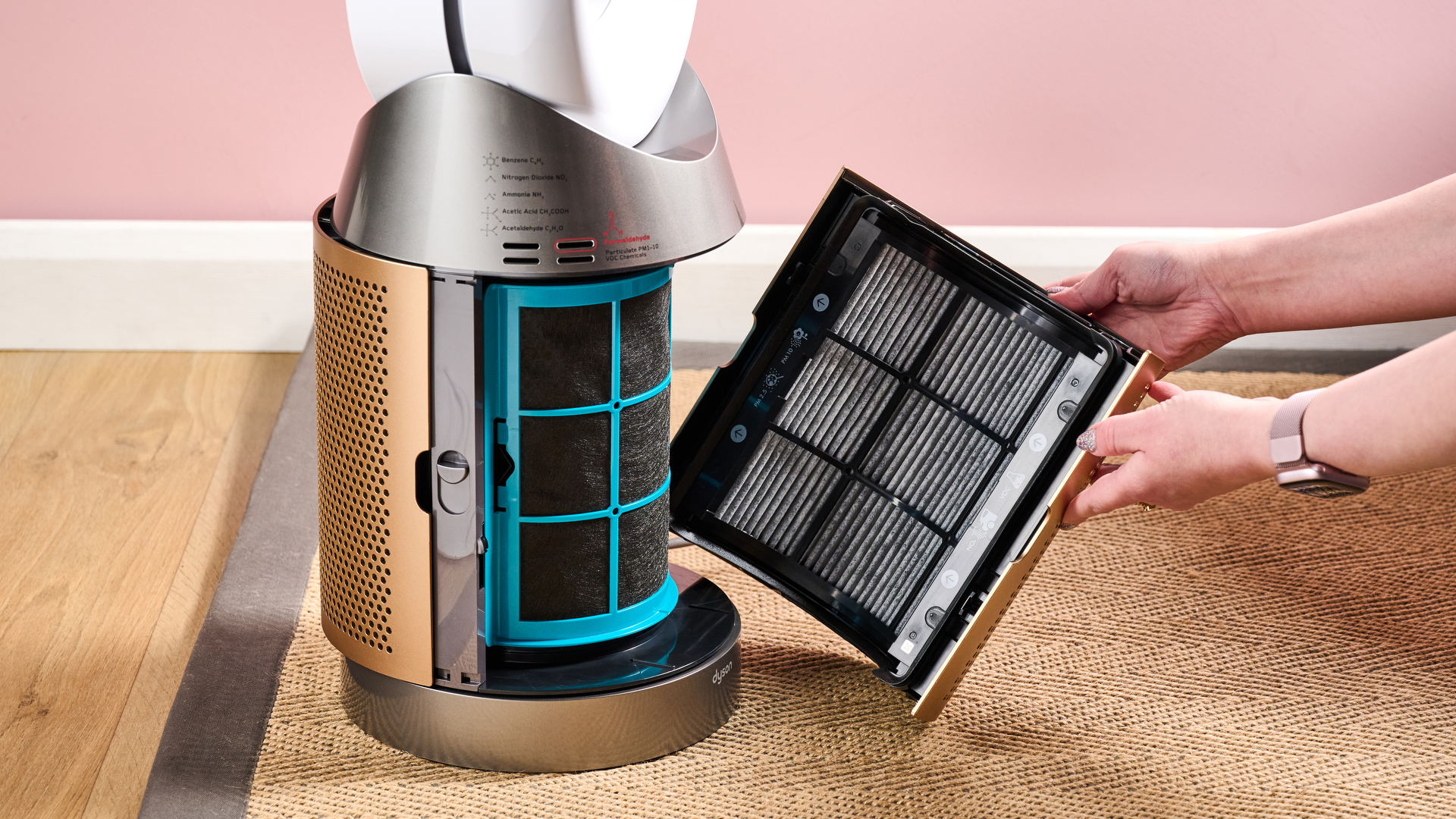
When shopping for an air purifier, it’s always a good idea to check out the prices of replacement filters, so you don’t get a nasty shock when it comes time to switch them out. Dyson recommends changing the HEPA H13 filter every twelve months, based on it running twelve hours a day. As a replacement filter for the TP09 has a list price of $79.99 / £75 / AU$99, it’s worth factoring this cost into your budget.
If you’ve got your heart set on a Dyson purifying fan, but don’t have the budget for this model, I’d recommend taking a look at the Dyson Purifier Cool Gen1 TP10 Purifying Fan instead. However, if you can afford the extra spend, it’s worth it for the benefits of the air quality data, app control, and the diffused mode.
- Value score: 4 out of 5
Dyson Purifier Cool Formaldehyde TP09 review: specs
Type | Purifying tower fan |
Fan speeds | 10 |
Oscillation | 45, 90, 180, 350 degrees |
Timer | Yes |
CADR (Clean air delivery rate) | Requested |
Filter | HEPA H13 and activated carbon |
Particle sizes detected | PM2.5, PM10, HCHO, VOCs, NO2 |
Dimensions | 8.7 x 8.7 x 41 inches / 22 x 22 x 105cm |
Weight | 10.7 lb / 4.85kg |
Control | Onboard power button, remote control, app, and voice control |
Additional modes | Auto, Night mode, Diffused mode |
Dyson Purifier Cool Formaldehyde TP09 review: design and features
- Attractive design and colorway
- Diffused mode for purifying when you don’t need cooling
- Capable of detecting and reacting to a wide range of contaminants
With its large loop amplifier, it doesn’t take a second look to know that the TP09 purifying fan is a Dyson. The materials look and feel good quality, and the overall build feels satisfyingly sturdy. I’m also a big fan of the white and gold colorway, though I’d say it’s really more of a copper tone than gold, personally.
A clever combo of a bladeless tower fan and an air purifier, the TP09 offers a solution to a niggle I had with the cheaper Dyson Purifier Cool Gen1 TP10 model, which was that I couldn’t make use of the higher purifier settings without being blasted with air from the fan. This solution comes in the form of Diffused mode, which diverts the airflow out of the back of the loop amplifier, so I no longer feel like I’m making it face the corner in shame when I want to make the most of its purifying capabilities.
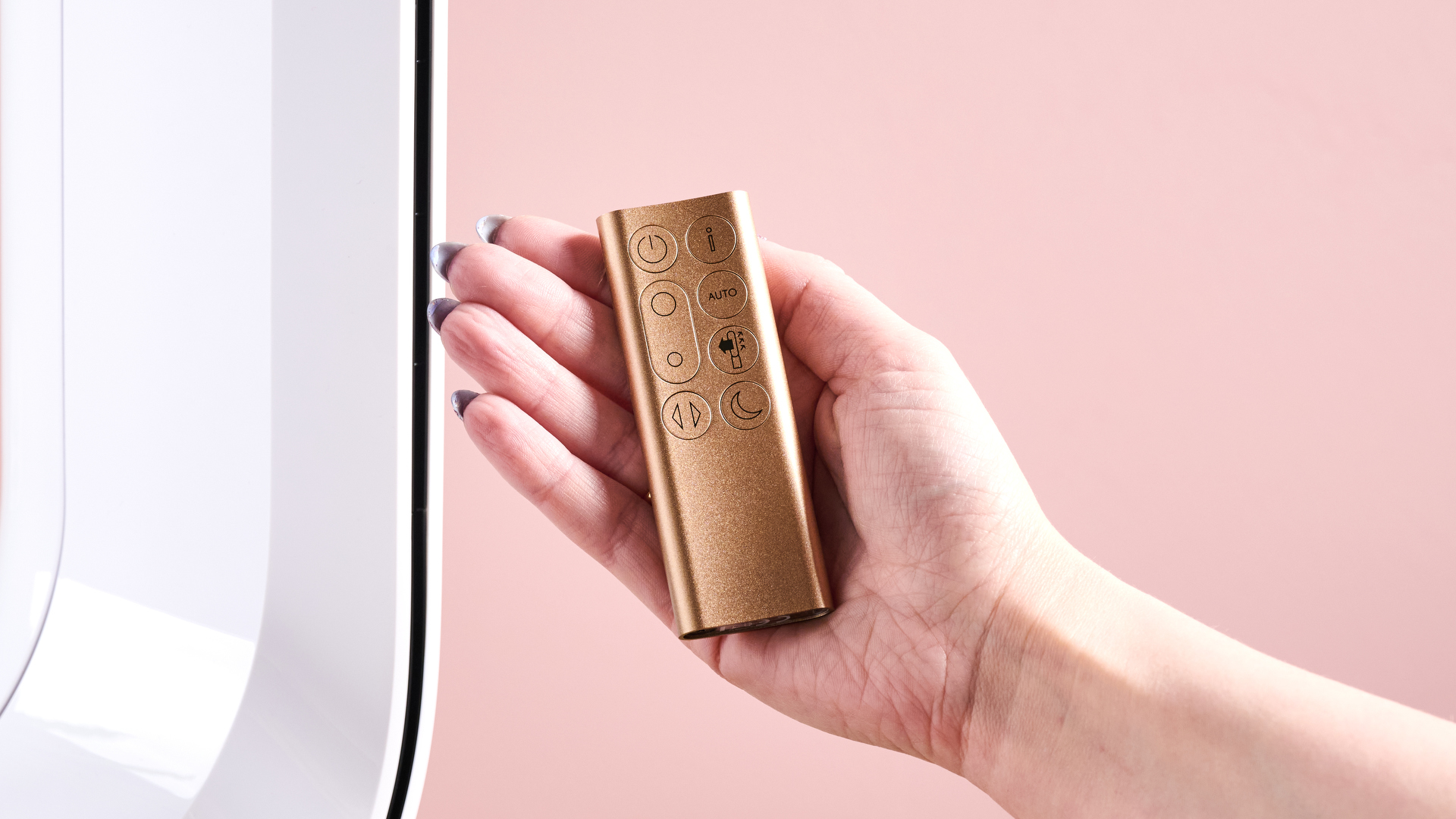
The setup process was fairly easy, though at a weight of 10.7 lb / 4.85kg and with no carry handles, I’d definitely recommend pulling the side of the box down before sliding the TP09 out, rather than trying to lift it out as stated in the online manual. Curiously, Dyson included a leaflet that’s only printed on one side to communicate that they’ve moved the setup process online to save paper.
I’d also really like to see brands like Dyson doing more product and transit testing to see whether they can cut back on their use of plastic wrap, as individually wrapping both halves of the air filter, the entire tower fan and the outer cardboard box in plastic feels somewhat excessive.
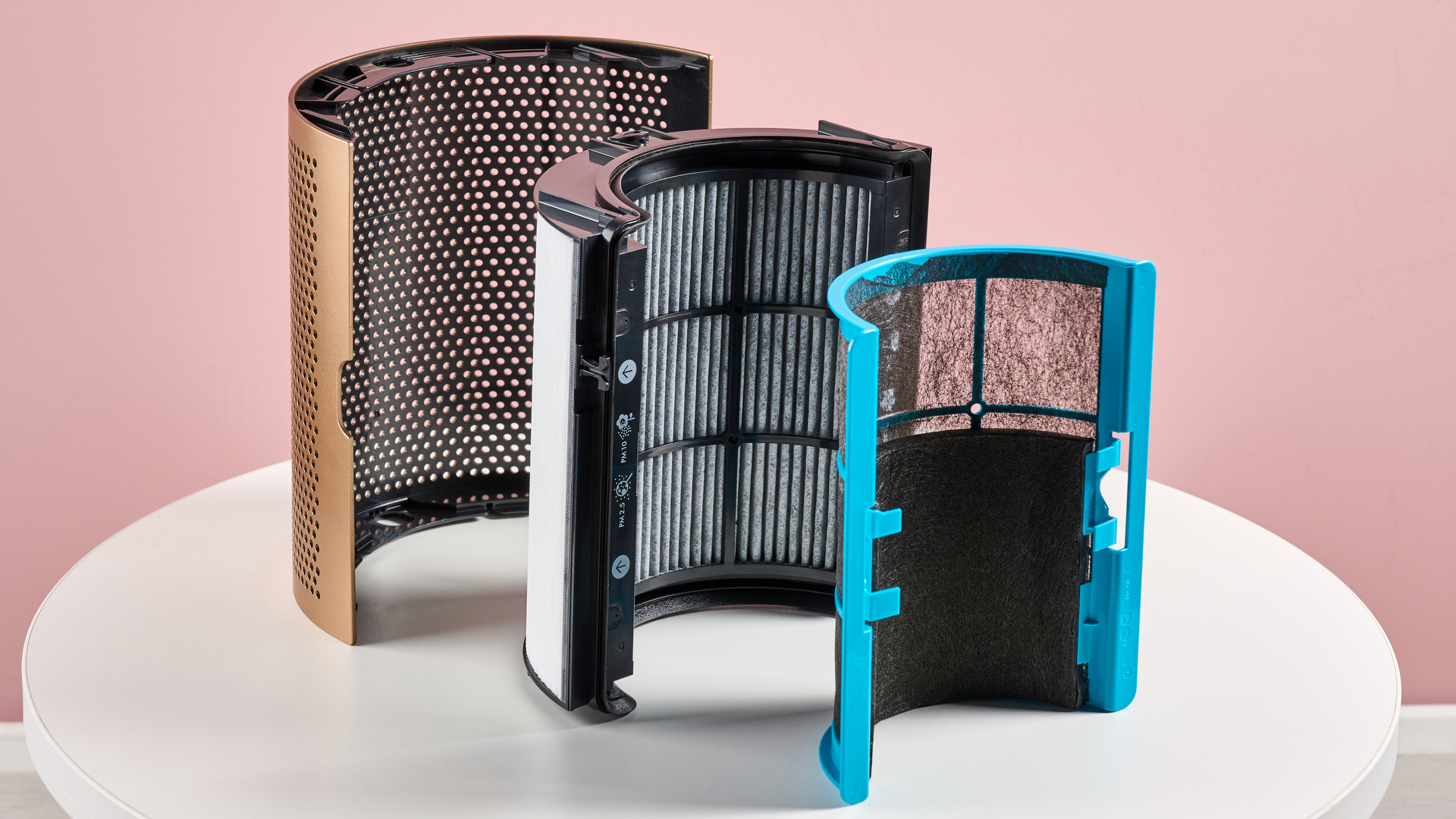
The TP09 uses the same H13 HEPA filter that’s used in most of their newer models, including the cheaper ones, but adds a permanent catalytic filter, which continuously traps and converts formaldehyde (HCHO) into water and CO2. Another big difference between the TP09 and cheaper models is its ability to detect and react to more than just PM2.5 and PM10 – which are particles up to ten microns in size, including smoke, bacteria, and dust – as it can also detect and react to volatile organic compounds (VOCs) and nitrogen dioxide, too.
The large and well-lit LCD screen on the front of the purifying unit made it easy to keep an eye on the overall air quality or the level of individual pollutants. I could cycle through the different readings using the satisfyingly color-matched remote, which also allowed me to enable diffused mode, auto mode, and night mode, as well as adjust oscillation angle, and airflow speed.
- Design score: 4.5 out of 5
Dyson Purifier Cool Formaldehyde TP09 review: app
- Shows a week's worth of air quality data in 15-minute intervals
- App remote control is responsive
- Provides extra options for timer and oscillation
It’s quick and easy to get an insight into the air quality in the room on the MyDyson app, thanks to the helpful graph that shows the overall air quality in fifteen-minute intervals over the last week. It specifies the most dominant pollutant at the time, which is useful for working out exactly what’s causing any drops in air quality. There are also graphs available to show the level of each pollutant, as well as for ambient temperature and humidity.
The app offers lots of detail on what various terms mean; for example, it lists the different air quality ratings, explains what each one means, what action should be taken, and gives details on each contaminant type it detects. It also provides the ranges of the pollutant readings, such as a reading of 0-35 micrograms per cubic meter being considered Good, and 151-250 being Extremely Poor.
One thing that anyone purchasing the TP09 (or any of Dyson’s air purifiers, really) needs to do in the first instance is to make sure that continuous monitoring is turned on, as it is switched off by default. Without doing this, your air purifier won’t consistently collect data. It’s simple enough to enable, either in the machine settings within the MyDyson app, or by holding the Auto button on the remote for roughly five seconds, until the LCD screen on the device confirms the setting has changed.
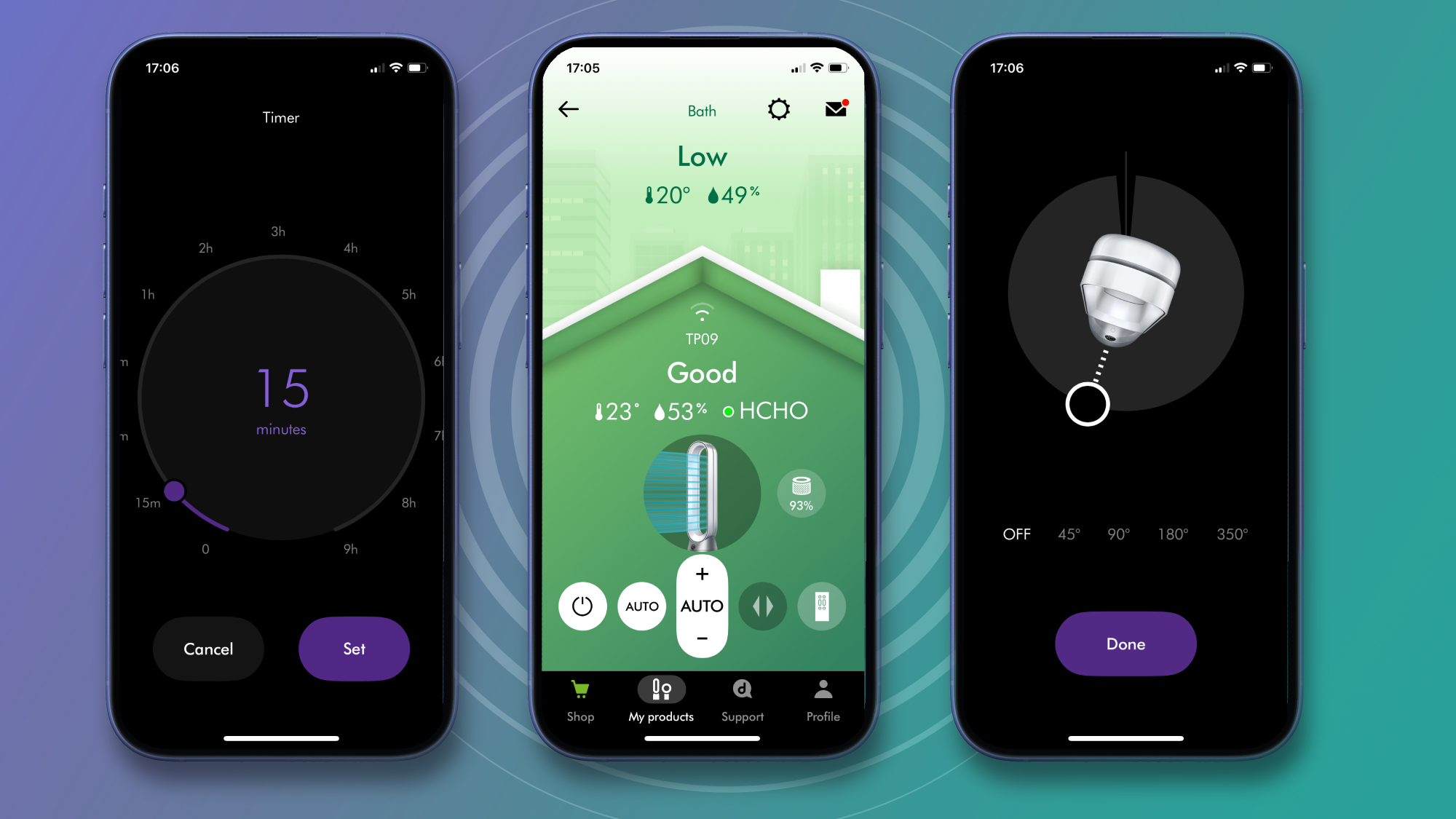
Along with providing plenty of data on the air quality inside my home, I was also able to keep up to date with what was going on outside. After entering my location into the MyDyson app, I had access to a simple-to-read dashboard detailing the external temperature, humidity, grass pollen level, plus PM2.5, PM10, and NO2 readings.
The level of controls on offer was fantastic. There are basic settings for power, auto mode, oscillation, and fan speed available on the main TP09 dashboard, but further controls became available after pressing the remote icon. This gave me access to all of the controls I had on the remote, but with far more flexibility. For instance, there's a timer that’s separate from Night mode and offers a wider duration variety. There's also an option to choose which position the TP09 begins its oscillation from – this is a fabulous feature to have, as it saves having to go and manhandle the fan if it’s not quite in the right position.
- App score: 4.5 out of 5
Dyson Purifier Cool Formaldehyde TP09 review: performance
- Easy and straightforward to operate
- Detects and reacts to a wide range of contaminants
- Fast detection and reaction speeds
The Dyson Purifier Cool Formaldehyde TP09 purifying fan was satisfyingly easy to operate throughout my weeks of testing it. Controlling it was simple and stress-free, as both the remote control and the controls on the app were straightforward and very responsive.
I didn’t have much luck when setting up voice control, but I can’t say if this is a fault with the appliance or the third-party apps I was using. I could voice record Siri shortcuts, and they would appear in the Shortcuts app on my iPhone, but my voice commands failed to work.
I had a bit more success when using my Alexa Echo Dot (5th Gen); it was easy to add the Dyson skill on my Alexa app, and I could turn the purifier on and off, and ask to increase or decrease the fan speed. However, I couldn’t get it to switch to Auto mode or oscillate; instead, it would state the action request was not supported on the Dyson machine, which is disappointing at this price point.
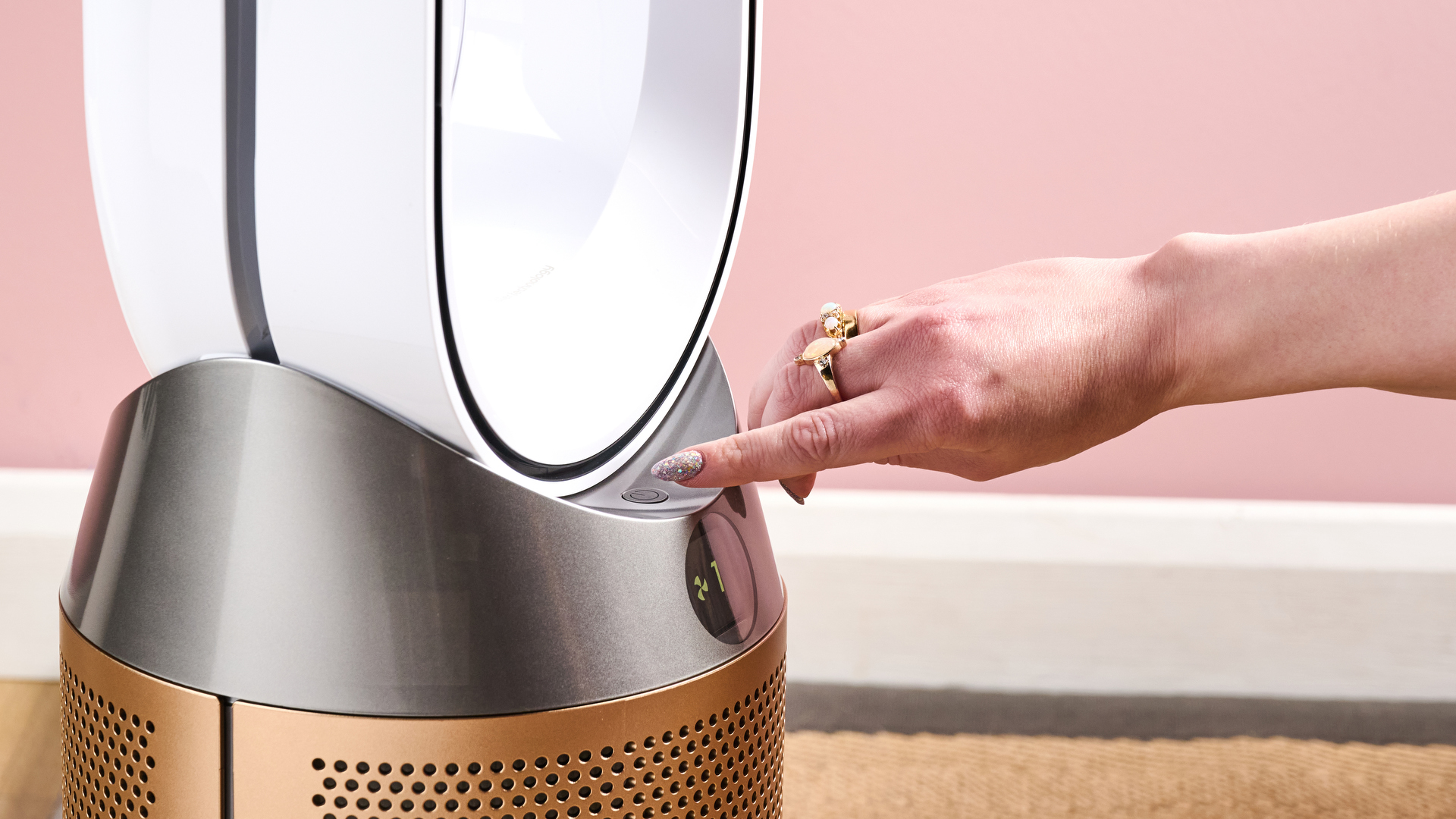
From a fan perspective, the airflow was nice and smooth, and the strength was as I’d expect from one of Dyson’s bladeless tower fans. I found I could feel a noticeable breeze from around 3ft / 1m away on the lowest setting, 8ft / 2.4m on setting five, and 13ft / 4m on top setting ten.
The TP09 was speedy to react when I sprayed dry shampoo towards it from roughly 2 feet away, raising the PM2.5 reading to Severe almost instantly and upping the fan speed in response, swiftly returning the air quality reading within a minute of the contamination being detected.
The TP09 was quick to notice whenever I sprayed myself with perfume in the mornings, too, even though I was on the other side of the room. After promptly bumping the airflow up to setting five, it gradually lowered fan speed over the course of an hour. It didn’t have an impact on the fragrance in the air, which I was happy with in this instance, as my bedroom smelled pretty. But considering this alongside the performance of the TP10, which has the same filter, it looks likely that it’d struggle to make any noticeable effect on cooking smells without manually running it on a higher fan speed for a longer period of time.
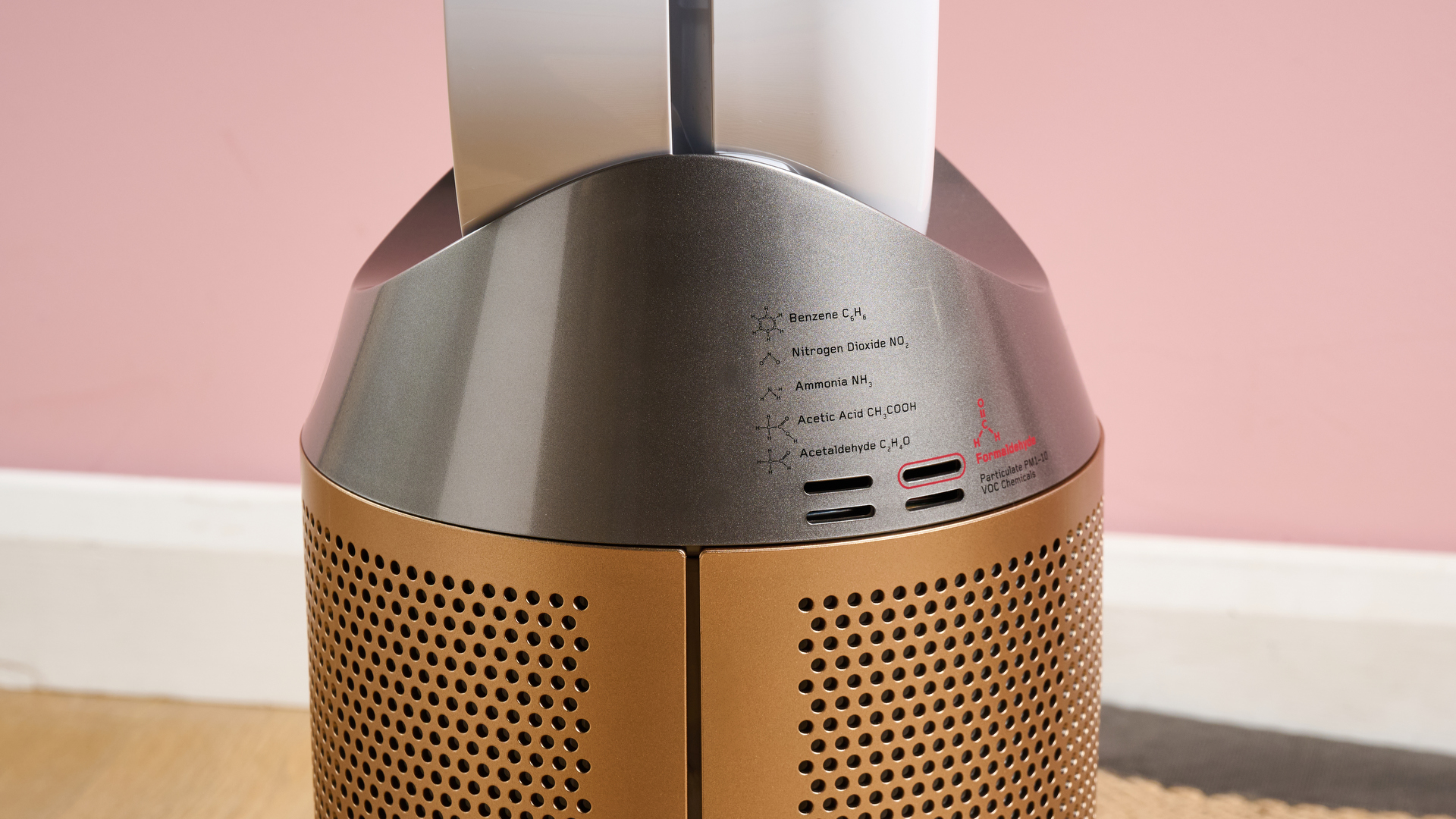
I found it easy to sleep with the TP09 placed on the other side of my small nightstand, both in Night mode – which lowered the fan speed if I was running it higher and turned off the display – and when in standard Auto mode.
The decibel readings I got from the TP09 were, unsurprisingly, very similar to those of the TP10; with readings of 33dB on fan speed one, 43dB on speed five, and 52dB on speed ten. This means that its volume levels were similar to that of soft music at its quietest, and moderate rainfall at its loudest. The key difference between the two models is that the TP09 was not as quiet when in auto mode, as its superior detection skills meant that it didn’t relax and sit idling like the TP10.
Overall, I was very happy with the performance of the Dyson Purifier Cool Formaldehyde TP09 purifying fan, thanks to its prompt contamination detection and great level of detail and fine-tuning available in the fantastic companion app.
- Performance score: 4.5 out of 5
Should I buy the Dyson Purifier Cool Formaldehyde TP09?
Section | Notes | Score |
|---|---|---|
Value for money | This isn’t a bad price for a Dyson tower fan combined with a good spec and well-performing air purifier. It offers more value for money than some of the slightly cheaper models that don’t have the skills to detect more than just PM2.5 or PM10. | 4/5 |
Design & Features | I love the premium-looking aesthetic and colorway of the TP09, and I’m pleased with its features, too. It can detect and react to a wide range of contaminants, and has a useful Diffused mode so it won’t blast me with cold air when purifying in the winter months. | 4.5/5 |
App | The MyDyson app offers a good level of insight into ambient and local air quality readings, both inside and outside the home. It also worked well as a responsive remote control, which offered useful additional settings. | 4.5/5 |
Performance | The TP09 delivered an impressive performance overall. It proved easy to operate, the controls were responsive, and it was quick to react whenever contaminants were introduced. | 4.5/5 |
Buy it if...
You want a purifier that can react to a wider range of contaminants
If you can afford one, it’s always better to opt for an air purifier that can detect more than just PM2.5 and PM10, as reduced air quality is often caused by other contaminants like VOCs, so having a purifier that’s reactive to these changes makes it easier to improve the air quality in your home.
You want to keep an eye on your air quality levels
With an overall air quality graph and others dedicated to each contaminant, it’s easy to get an overview of your home's air quality throughout the day and pinpoint potential sources of contamination.
You want settings you can fine-tune
The MyDyson app gives you access to a wider range of timer durations, allows you to choose exactly where the TP09 starts oscillating from, and offers scheduling too, so you can set it this Dyson up just as you’d like it.
Don't buy it if...
You want something cheap and simple
This is a pricey purifying fan, and you could buy a cheaper tower fan and air purifier separately if you’re happy with a more basic air purifier that requires more manual intervention.
You want a desktop-sized air purifier
The TP09 is tall and heavy, and would likely be overkill if you just want to freshen the air in a small home office.
You don’t want a tower fan
If you’re only really interested in a high-tech air purifier, then you’d be better off looking at something like the Dyson Purifier Big+Quiet Formaldehyde instead.
Dyson Purifier Cool Formaldehyde TP09 review: Also consider
| Header Cell - Column 0 | Dyson Purifier Cool Formaldehyde TP09 | Dyson Purifier Cool Gen1 TP10 | Blueair Blue Pure 411i Max / Blue Max 3250i |
|---|---|---|---|
Type | Purifying tower fan | Purifying tower fan | Air purifier |
Price | $749.99 / £549.99 / AU$999.99 | $429.99 / £449.99 / AU$799 | $169.99 / £169 |
Fan speeds | 10 | 10 | 3 |
Additional modes | Auto, Night mode, Diffused mode | Auto, sleep mode | Auto, night mode |
Oscillation | Up to 350 degrees | Up to 350 degrees | N/A |
Filter | HEPA H13 and activated carbon | HEPA H13 and activated carbon | HEPASilent and activated carbon |
App support | Yes | No | Yes |
Dimensions | 8.7 x 8.7 x 41 inches / 22 x 22 x 105cm | 8.7 x 8.7 x 41.3 inches / 22 x 22 x 105cm | 18.9 x 10.6 x 10.6 inches / 48 x 27 x 27cm |
Weight | 10.7 lbs / 4.85kg | 10.4 lbs / 4.7kg | 7.5 lbs / 3.4kg |
Dyson Purifier Cool Gen1 TP10
If you’re looking for a cheaper Dyson model, the TP10 is a very similar size and weight to the TP09, and uses the same HEPA 13 filter, but is only able to detect and react to the presence of PM2.5 and PM10 contamination. While it isn’t compatible with the MyDyson app, the large integrated display makes it easy to check the status of the air quality in the room. For more details, head over to my full review of the Dyson Purifier Cool Gen1 TP10.
Blueair Blue Pure 411i Max / Blue Max 3250i
If you’re looking for a stand-alone air purifier that’s more cost-friendly, but still smart, then this lightweight air purifier from Blueair is worth your consideration. It’s ideal for smaller rooms like bedrooms or offices, and offers an insight into the ambient air quality and remote control via the companion app. If you’d like to learn more, take a look at my full Blueair Blue Pure 411i Max / Blue Max 3250i review.
How I tested the Dyson Purifier Cool Formaldehyde TP09
- I used the Dyson TP09 purifying fan in my living room and bedroom
- I observed its detection and purification skills
- I evaluated the strength of the airflow and the sound levels
I used the Dyson Purifier Cool Formaldehyde TP09 purifying fan in our photo studio, my living room, and my bedroom over the course of a few weeks. I evaluated how easy it was to operate, along with the build quality and aesthetics, and explored the available functions and features.
I tested the strength of the airflow by determining at what distance I could still feel a cooling breeze. I also observed the TP09 Purifying Fan’s detection and purification skills during standardized testing, which included spraying dry shampoo towards it from around two feet away to test how quickly it would react and clear the contamination, and to see how it tackles odors. I also used it passively in my bedroom and my living room over a couple of weeks to see how it performed and how well it would report readings over time.
I used a decibel meter app on my iPhone to record the noise levels, taking readings from around two feet away and ensuring the fan wasn’t blowing directly into the microphone.
I checked the timer worked as expected, and tested out the sleep mode to see whether the TP09 was quiet enough for me to be able to sleep well with it running overnight.
- First reviewed: August 2025
- Read TechRadar's Reviews Guarantee

Cesci is a Reviews Staff Writer for TechRadar. She writes in-depth reviews based on her real-world testing across a variety of categories, but has a particularly keen interest in home tech, and has written features and reviews about gadgets ranging from headphones to smart lights to graphics tablets. She also has a broad range of experience from working in different industries, from sustainable materials and packaging to skin care.
You must confirm your public display name before commenting
Please logout and then login again, you will then be prompted to enter your display name.
